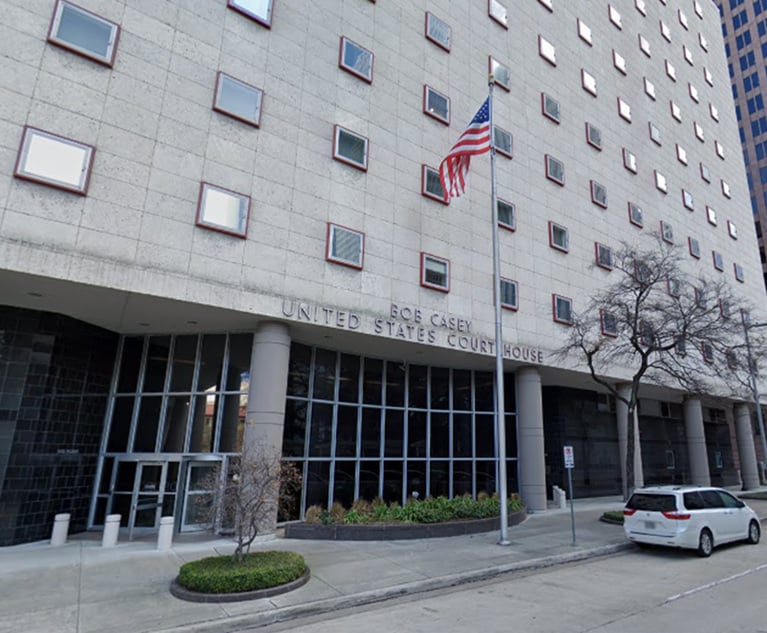Legal Industry Experiences 3 Quarters of Strong Demand and Revenue Growth
A Citi Private Bank report said many firms showed wider profit margins because demand and billing rates grew at a level that outpaced an increase in expenses
November 14, 2018 at 03:36 PM
4 minute read

The legal industry has experienced revenue growth through the first three quarters of 2018, as demand and billing rates grew at a level that outpaced an increase in expenses and created a wider profit margin for many firms, according to a new survey from Citi Private Bank's Law Firm Group.
Citi Private Bank on Wednesday released high-level results and takeaways from a law firm advisory services 9-month flash survey that painted a largely positive picture of the legal industry's business results so far this year. The survey drew on participation from 190 law firms of varying size—44 Am Law 50 firms; 35 Am Law 51-100 firms; 51 Am Law Second Hundred firms; and 60 others—a group that includes boutique and niche firms.
Across the legal sector, Citi reported revenue growth through the first three quarters of 2018, attributing that to a combination of higher billing rates and demand growth. But the bank also noted that revenue growth was “tempered” by a slow cycle of law firm collections.
David Altuna, client advisor and senior vice president of Citi Private Bank's Law Firm Group, said in an interview on Wednesday that the legal industry is still in a period of modest growth, particularly when compared to conditions that prevailed prior to the recession of a decade ago. But the demand increases in 2018 are a positive sign, he added.
“Here we are in 2018 and we have demand growth of 2.5 percent at the 9-month point,” he said. “That's a really healthy story.”
The survey also looked at expenses, which Citi said have increased this year as well, driven in larger part by higher compensation compared with increases in operating costs. Expanding on those findings, Altuna said raises for associates this year have contributed to an acceleration in compensation increases.
While expenses grew, they did so at a lesser rate than the revenue growth, a dynamic that has created a widened profit margin on average across the industry, according to Citi. But there's more to the story when looking at firms of different sizes. Altuna said the top 50 Am Law firms have borne a higher expense burden in light of associate pay increases, compared with other smaller firms.
“What we're seeing in 2018 is more expense pressure than we might expect in a year of top-line growth,” said Altuna. “It's showing you the pressure that adds when you raise comp across the associate scale.”
But at the same time, he added, those top-earning firms have had an outsized impact on revenue growth in the legal industry as a whole, a dynamic that offers some offsetting to the expense pressure from increased lawyer compensation. The Am Law Second Hundred, meanwhile, has seen less robust revenue growth and are still feeling pressure from operating expenses.
“In a lot of these results, you're seeing a lot of dispersion across market sectors,” said Altuna. “The revenue story is being driven disproportionately by the Am Law 50.”
The Citi survey also showed positive signs for the rest of the year. Specifically, the bank reported that inventory has grown at law firms, primarily due to increases in unbilled time but also due to increases in accounts receivable. Altuna described the inventory results as a “tailwind” that builds on strong economic markers in other areas. And, he said, the increase in inventory should lead to a strong collection season this year.
“We do expect firms to collect on most of that,” said Altuna. “We've heard from firms that they're very focused on collections this year.”
Citi's positive survey results come on the heels of a Thomson Reuters Peer Monitor Index third quarter report that showed demand in the legal industry had reached a post-recession high.
The third quarter surveys from both Citi and Thomson Reuters also build on signs from earlier this year that pointed toward strong financials in the legal industry. In a half-year review issued in August, Citi said that the first half of the year saw the industry increase revenue by 5.5 percent, the highest such increase since 2007.
That revenue growth has since accelerated to 6.3 percent through the first three quarters of 2018, according to Citi's latest survey.
Read More:
Demand for Big Law Hits Post-Recession High: Report
Law Firms Just Turned in Their Best Half Since the Recession
This content has been archived. It is available through our partners, LexisNexis® and Bloomberg Law.
To view this content, please continue to their sites.
Not a Lexis Subscriber?
Subscribe Now
Not a Bloomberg Law Subscriber?
Subscribe Now
NOT FOR REPRINT
© 2025 ALM Global, LLC, All Rights Reserved. Request academic re-use from www.copyright.com. All other uses, submit a request to [email protected]. For more information visit Asset & Logo Licensing.
You Might Like
View All
Law Firms Expand Scope of Immigration Expertise Amid Blitz of Trump Orders
6 minute read

Am Law 100 Lateral Partner Hiring Rose in 2024: Report

JCPenney Seeks Return of More Than $1.1M From Jackson Walker For Bankruptcy Work
3 minute readTrending Stories
- 1Uber Files RICO Suit Against Plaintiff-Side Firms Alleging Fraudulent Injury Claims
- 2The Law Firm Disrupted: Scrutinizing the Elephant More Than the Mouse
- 3Inherent Diminished Value Damages Unavailable to 3rd-Party Claimants, Court Says
- 4Pa. Defense Firm Sued by Client Over Ex-Eagles Player's $43.5M Med Mal Win
- 5Losses Mount at Morris Manning, but Departing Ex-Chair Stays Bullish About His Old Firm's Future
Who Got The Work
J. Brugh Lower of Gibbons has entered an appearance for industrial equipment supplier Devco Corporation in a pending trademark infringement lawsuit. The suit, accusing the defendant of selling knock-off Graco products, was filed Dec. 18 in New Jersey District Court by Rivkin Radler on behalf of Graco Inc. and Graco Minnesota. The case, assigned to U.S. District Judge Zahid N. Quraishi, is 3:24-cv-11294, Graco Inc. et al v. Devco Corporation.
Who Got The Work
Rebecca Maller-Stein and Kent A. Yalowitz of Arnold & Porter Kaye Scholer have entered their appearances for Hanaco Venture Capital and its executives, Lior Prosor and David Frankel, in a pending securities lawsuit. The action, filed on Dec. 24 in New York Southern District Court by Zell, Aron & Co. on behalf of Goldeneye Advisors, accuses the defendants of negligently and fraudulently managing the plaintiff's $1 million investment. The case, assigned to U.S. District Judge Vernon S. Broderick, is 1:24-cv-09918, Goldeneye Advisors, LLC v. Hanaco Venture Capital, Ltd. et al.
Who Got The Work
Attorneys from A&O Shearman has stepped in as defense counsel for Toronto-Dominion Bank and other defendants in a pending securities class action. The suit, filed Dec. 11 in New York Southern District Court by Bleichmar Fonti & Auld, accuses the defendants of concealing the bank's 'pervasive' deficiencies in regards to its compliance with the Bank Secrecy Act and the quality of its anti-money laundering controls. The case, assigned to U.S. District Judge Arun Subramanian, is 1:24-cv-09445, Gonzalez v. The Toronto-Dominion Bank et al.
Who Got The Work
Crown Castle International, a Pennsylvania company providing shared communications infrastructure, has turned to Luke D. Wolf of Gordon Rees Scully Mansukhani to fend off a pending breach-of-contract lawsuit. The court action, filed Nov. 25 in Michigan Eastern District Court by Hooper Hathaway PC on behalf of The Town Residences LLC, accuses Crown Castle of failing to transfer approximately $30,000 in utility payments from T-Mobile in breach of a roof-top lease and assignment agreement. The case, assigned to U.S. District Judge Susan K. Declercq, is 2:24-cv-13131, The Town Residences LLC v. T-Mobile US, Inc. et al.
Who Got The Work
Wilfred P. Coronato and Daniel M. Schwartz of McCarter & English have stepped in as defense counsel to Electrolux Home Products Inc. in a pending product liability lawsuit. The court action, filed Nov. 26 in New York Eastern District Court by Poulos Lopiccolo PC and Nagel Rice LLP on behalf of David Stern, alleges that the defendant's refrigerators’ drawers and shelving repeatedly break and fall apart within months after purchase. The case, assigned to U.S. District Judge Joan M. Azrack, is 2:24-cv-08204, Stern v. Electrolux Home Products, Inc.
Featured Firms
Law Offices of Gary Martin Hays & Associates, P.C.
(470) 294-1674
Law Offices of Mark E. Salomone
(857) 444-6468
Smith & Hassler
(713) 739-1250










